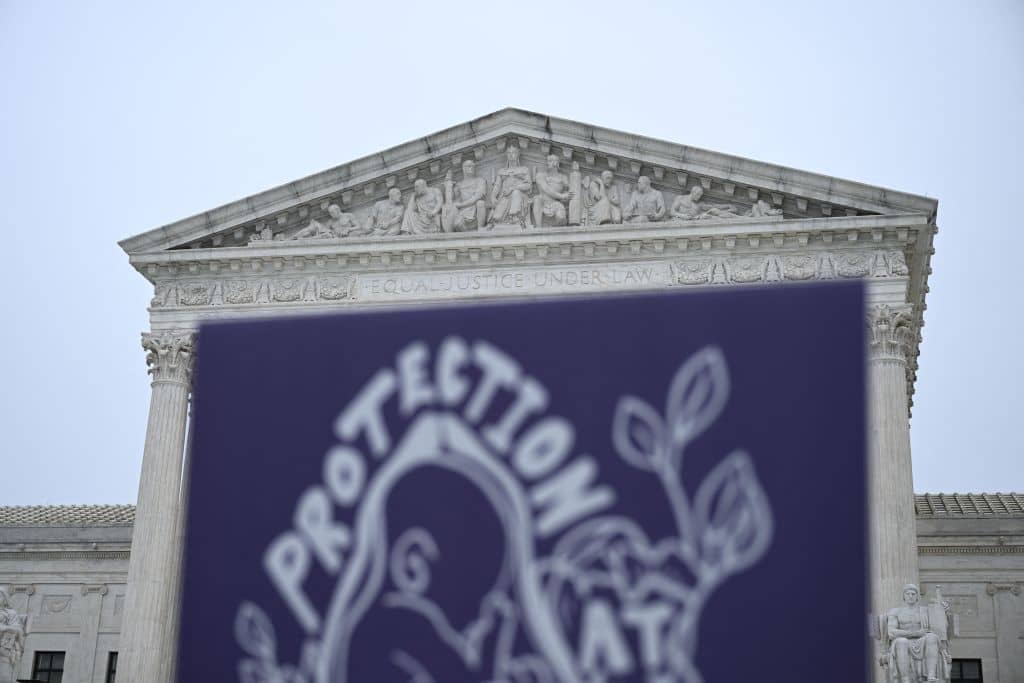The jurist, Ronald Dworkin, once described the vehemence of the dispute over abortion as ‘America’s new version of the terrible seventeenth-century European civil wars of religion. Opposing armies march down streets or pack themselves into protests at abortion clinics, courthouses, and the White House, screaming at and spitting on and loathing one another. Abortion is tearing America apart.’
That’s exactly what we see today. The US Supreme Court’s 1973 Roe decision has, of course, for almost half a century been an ideological football. Last week’s leaked draft of what appears to be a volte face by the Court merely revived the acrimony and rancour that the issue inexorably generates.
In his draft opinion Justice Alito described Roe as ‘egregiously wrong from the start’ because ‘a right to abortion is not deeply rooted in the Nation’s history and traditions.’
Roe is the slender thread by which the right of American women to a lawful abortion hangs. It never should have been
This may be so, but there is a deeper flaw in the historic decision. It is to do with the right to privacy. While the absence of constitutional or historical support for the right to abortion is a compelling ground on which to question its cogency, recruiting the concept of ‘privacy’ to uphold a woman’s choice to abort a foetus is a ‘category error.’
Judges have deployed the invented idea of ‘decisional privacy’ to protect the exercise of personal choice in respect of matters such as the use of contraception, sexual preference, and, of course, abortion – in the name of the right to privacy.
It is easy to see why this mistake has occurred. Freedom to make these sorts of personal choices without government interference does resemble the right to privacy or ‘private life’ encapsulated in the elastic ‘right to be let alone’ that launched the privacy debate in late nineteenth century America. But the courts have confused individual autonomy with privacy. In other words, the fact that these are recognised as private choices shielded from public interference does not lead ineluctably to their being described as ‘privacy’ issues.
This may seem semantic legal pedantry. But to conflate ‘privacy’ with autonomy is to ignore the crucial nature of the right to privacy which principally concerns the protection of intimate or sensitive facts about us. Allowing it to develop into an amorphous concept to be promiscuously applied to a diverse collection of issues saps it of its core meaning.
Privacy emerged in the United States as common law right which recognised that defendants could be liable for a number of new wrongs, including intrusion (typically by electronic devices) into their homes or workplaces, and unwanted publicity given to intimate facts by, in particular, the press.
This development has, more or less, been followed by our courts, often adopting the approach espoused by the European Court of Human Rights, including, unhappily, some of the bloated abstractions of Article eight of the European Convention on Human Rights (the text of our own – mercifully, soon to be replaced – Human Rights Act). But, so far at least, they have resisted recognising the specious notion of ‘decisional privacy’. English judges have largely confined the application of Article eight to the ‘misuse of personal information’, which should continue to be the principal concern of any sensible approach to the protection of privacy.
The same restraint cannot be said of the European Court of Human Rights which has, for example, deployed the notion of ‘private life’ in Article eight to protect the right to sleep, and the right to ‘establish and develop relationships …for the development and fulfilment of one’s own personality’. This incoherence does not help to solve the central privacy problem: protecting our personal information from misuse especially online. The more voluminous the concept, the less likely is its intelligible expression and, hence, legal recognition. Moreover, it inflicts collateral damage on competing rights, particularly freedom of expression. An inflated, imprecise notion of privacy is already showing signs of encroaching on free speech in our courts.
Roe is the slender thread by which the right of American women to a lawful abortion hangs. It never should have been; the matter is one of autonomy not privacy. This is well captured, if crudely, by the hostile moral contest between ‘pro-choice’ and ‘pro-life’ groups. A re-assessment of Roe triggered by Alito’s forceful opinion could result in the formulation of a clearer conception of ‘privacy’ which would benefit not only that right but other related, competing values. This, however, seems unlikely.
An American colleague
once reminded me that since a federal law on abortion would
never be passed by Congress in a deeply divided society, Roe was
the only way to guarantee the right to abortion. This may be
true and the subject may have to remain in the hands of state
legislatures, as is increasingly the case. But isn’t that the point of a
democratic federal system?






Comments